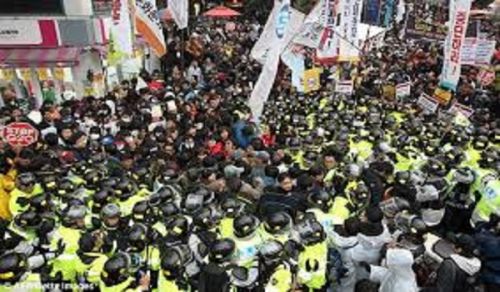
بسم الله الرحمن الرحيم
News & Comment
Will the G20 Summit Protests Really Change Anything?
News
Tens of thousands of anti-capitalism demonstrators from across the world gathered in the German city of Hamburg to protest against the G20 Summit on the 7th and 8th of July attended by leaders from the 20 richest nations.
Demonstrators represented a host of various causes, including those calling for an end to global poverty, massive inequality in wealth, and colonial wars across the world as well as pro-environmentalists. Despite the variety of messages, protestors were united in their anger towards the capitalist system and its globalization policies which they rightly blamed for reaping chaos, injustice, inequality, and utter misery within nations and across the world.
Comment
Such massive protests against gatherings, such as the G20 summit or massive anti-austerity and anti-capitalist demonstrations taking place in countries worldwide like the one in the UK on the 1st of July attended by thousands, clearly show the massive dissatisfaction with the capitalist world order. This is hardly surprising for the laws and policies of this unjust system have concentrated wealth in the hands of the elite few, enriched banks and corporations at the expense of the masses, monopolized the resources of the world, impoverished millions and bankrolled destructive wars aimed at plundering the wealth of foreign lands. Indeed, this toxic system has had its day! Unfortunately, these mass rallies fail to even dent the fall-out of the current capitalist world-order or create any significant political change. We see, for example, how the Occupy Wall Street movement which arose to protest against global economic inequality and undue influence of corporate power on governments, and which spread to cities across the world had little to no impact in changing the status quo.
This is because these movements and demonstrations present a list of demands or ideals they wish to achieve to improve the lives of people and to remove injustice but lack a clear vision and path as well as a credible alternative political model with sound economic and social solutions to realise these goals. Moisés Naím, for example, a contributing editor at The Atlantic writes, “There is a powerful political engine running in the streets of many cities. It turns at high speed and produces a lot of political energy. But the engine is not connected to wheels, and so the “movement” doesn’t move.”
Activists often call for new policies which only represent partial reform within their states while maintaining the general outline of the capitalist system despite the fact that the whole system is not fit for purpose. Or they call for change within the framework of the democratic system, arguing that there should be improvement in the democratic fundamentals of states to battle corporate power or unjust capitalist policies.
However, they miss the point that it was the democratic system, where human beings legislate, which opened the door to the ruling elite making laws for self-preservation and self-profit and to benefit the rich and the powerful rather than ordinary citizens.
Furthermore, those who support a socialist system to replace the capitalist one in their states seem to ignore the utter failure of the socialist experiments in countries ,such as Cuba and Venezuela, where so many now live in abject poverty, or the failure of socialist parties in France, Greece, Argentina and elsewhere to tackle the economic crisis in their countries. And in Britain, those who see the socialist Labour leader, Jeremy Corbyn, as the new Messiah able to cure the economic injustices and woes of the country seem to have forgotten that socialist rule in the UK in the 1970’s resulted in the ‘Winter of Discontent’ where widespread strikes in the public sector brought the country to its knees. They were organized by powerful trade unions opposing pay caps by the then socialist Labour government introduced to control inflation. Socialism, therefore, offers nothing but a ‘feel-good political illusion’ to counter the tragedies caused by capitalism.
The reality is that both the capitalist and the socialist systems have failed to organize their economies to ensure economic justice and prosperity that are sustainable and enjoyed by all rather than a few. The Islamic economic system, implemented by the Khilafah, is the only one that has a time-tested record of success in solving poverty as well as generating economic prosperity within a state.
This is firstly due to the fundamental basis of the system that is focused on the effective distribution of wealth rather than its production (as with capitalism); and secondly, a host of sound economic principles and laws which achieve both the fair distribution of wealth and the generation of prosperity. This includes the prohibition of interest and the hoarding of wealth which prevent the concentration of wealth in the hands of a few. It also includes the rejection of the privatization of public resources, ensuring that all benefit from their fruits.
Moreover, it includes the implementation of the gold standard monetary system which prevents inflation and the application of a low taxation system that encourages investment, expansion of businesses, and employment. It is, therefore, the Khilafah, based on the method of the Prophethood, alone which is the credible alternative political system which can put an end to the global tragedies of capitalism.
Written for the Central Media Office of Hizb ut Tahrir by
Dr. Nazreen Nawaz
Director of the Women’s Section in the Central Media Office of Hizb ut Tahrir




